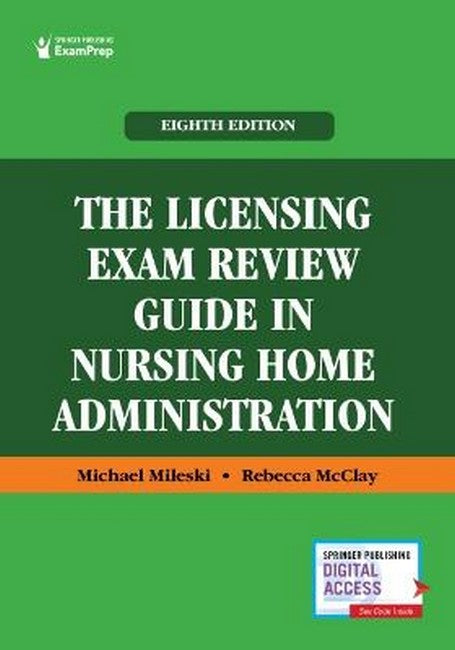- Introduction: Uses of this Study Guide for the NAB Domains of Practice
- Format of the National Exam
- The "One-Best-Answer" Testing Format
- Deciding What the Question Is
- Deciding What the Answer Is
- Strategies for Test Taking
- PART 1: LEARNING HOW TO MANAGE THE HEALTH CARE ORGANIZATION (NAB DOMAIN: LEADERSHIP AND STRATEGY)
- 1.1 Management Functions
- 1.1.1 Levels of Management
- 1.1.2 Line-Staff Relationships
- 1.2 Forecasting
- 1.3 Planning
- 1.3.1 Why Plan?
- 1.3.2 Steps in Planning
- 1.4 Organizing
- 1.5 Staffing
- 1.6 Directing
- 1.6.1 Policy Making
- 1.6.2 Making a Decision
- 1.6.3 Leading
- 1.6.4 Power and Authority
- 1.6.5 Communication Skills
- 1.6.6 Organizational Norms and Values: Code of Ethics and Standards of Practice
- 1.6.7 Related Concepts
- 1.7 Comparing and Controlling Quality
- 1.7.1 Some Requirements for Effective Control of Quality
- 1.7.2 Diagnosing/Organizational Quality
- 1.8 Innovating
- 1.9 Marketing the Long-Term Care Facility
- 1.9.1 The Turn to Marketing
- 1.9.2 The "Marketing" of Health Care
- 1.9.3 Developing a Marketing Strategy
- 1.9.4 Marketing Concerns
- PART 2: UNDERSTANDING THE DEPARTMENTS AND MANAGING HUMAN RESOURCES (NAB DOMAIN: OPERATIONS)
- 2.1 Organization of the Nursing Facility and its Staff
- 2.1.1 The Administrators Office
- 2.1.2 Medical and Allied Functions
- 2.1.3 Dental Care
- 2.1.4 Foot and Eye Care
- 2.1.5 Pharmaceutical Services
- 2.1.6 Physical Therapy/Occupational Therapy/Speech Therapy
- 2.1.7 Laboratory and other Diagnostic Services
- 2.1.8 Nursing Services
- 2.1.9 The Business Office
- 2.1.10 Medical Records
- 2.1.11 Dietary Department
- 2.1.12 Social Services and Admissions
- 2.1.13 Activities/Recreation
- 2.1.14 Housekeeping
- 2.1.15 Laundry
- 2.2 Identifying the Human Resources Functions
- 2.3 Planning Employment Needs: Writing Job Descriptions
- PART 3: LEARNING TO MANAGE THE ORGANIZATIONS FINANCES (NAB DOMAIN: OPERATIONS)
- 3.1 The Administrators Role as Financial Manager
- 3.2 Generally Accepted Accounting Principles
- 3.3 Two Approaches to Accounting: Cash Accounting and Accrual Accounting
- 3.4 The Two Main Steps in the Accounting Process: Recording Transactions and Preparing Financial Statements
- 3.5 Putting Financial Statements to Work: Working Capital, Ration Analysis, and Vertical Analysis
- 3.6 Additional Accounting Procedures that Help the Administrator Maintain Control over the Facility
- 3.7 The Concept of Depreciation
- 3.8 Using "Costs" in Managerial Decisions
- 3.9 Budgets and Budgeting
- 3.10 Finance: The Broader Context
- PART 4: LEARNING THE CONTINUUM OF LONG-TERM CARE (NAB DOMAIN: ENVIRONMENT AND QUALITY)
- 4.1 Origins, Overview, and Current Profile of the Nursing Home Industry
- 4.2 The Social Security Act: Medicare and Medicaid
- 4.3 Older Americans Act
- 4.4 Labor and Management: Laws and Regulations
- 4.5 Workplace Safety: The Occupational Safety and Health Act
- 4.6 Fire Safety: The Life Safety Code (R)
- 4.7 Americans with Disabilities Act (ADA) Accessibility Guidelines for Facilities
- 4.8 Voluntary Operating Standards: The Joint Commission
- 4.9 The Affordable Care Act
- 4.10 The Elder Justice Act
- 4.11 Patient Driven Payment Models (PDPM)
- 4.12 Value Based Care and Pay for Performance (P4P)
- PART 5: BUILDING YOUR RESIDENT CARE SKILLS (NAB DOMAIN: CARE, SERVICES, AND SUPPORTS)
- 5.1 Aging Process
- 5.2 Medical and Related Terms
- 5.2.1. Specializations
- 5.2.2 Medications/Therapeutic Actions of Drugs
- 5.2.3 Abbreviations
- 5.2.4 Prefixes
- 5.2.5 Suffixes
- 5.3 The Aging Process as it Relates to Diseases Common to the Nursing Facility Population
- 5.3.1 Cardiovascular/Circulatory System
- 5.3.2 Respiratory System
- 5.3.3 Nervous System
- 5.3.4 Digestive Diseases
- 5.3.5 Nutrition
- 5.3.6 External and Internal Disease Mechanisms
- 5.3.7 Musculoskeletal System
- 5.3.8 Urinary (Renal) System
- 5.3.9 Reproductive System
- 5.3.10 Emotional and Mental Well-Being
- PART 6: PUTTING THE SYSTEMS TOGETHER
Request Academic Copy
Please copy the ISBN for submitting review copy form

